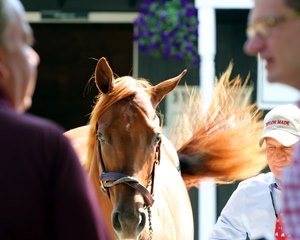New York-Bred Sale Poised to Build on Record Year


The activity level in the stable area of Fasig-Tipton's sale grounds in Saratoga Springs, N.Y., was crowded the morning of Aug. 10 as buyers and their trainers and agents went through their paces of inspecting yearlings to be offered during the Fasig-Tipton New York-Bred Yearling Sale.
Held at the Humphrey S. Finney sales pavilion, the auction takes place Aug. 11-12 with sessions beginning at 6:30 p.m. ET.
The sale company's annual consignor-preferred sale of horses bred in the Empire State was preceded earlier in the week by The Saratoga Sale, Fasig-Tipon's selected yearling sale that saw a record gross, co-record median price, and all-time second-highest average price.
Based on the selected sale outcome and the recent successes of New York-breds, the sale is poised to improve on its record-setting renewal a year ago.
"The strength of the market should continue and bodes well for this sale," said Fasig-Tipton president Boyd Browning Jr. "Some people with a lot of money to spend didn't get what they wanted earlier in the week (at the selected sale)."
One of the incentives for buying New York-bred horses is the lucrative New York Thoroughbred Development Fund that awards approximately $60 million in bonuses when horses registered in the program win certain races.
Fasig-Tipton has cataloged 327 entries, up about 10% from 2017, which produced across-the-board records for gross at $16,214,000, average at $89,088, and median of $69,500. The sale-topper, a Cairo Prince colt bought by Waves Bloodstock from RFHF Bloodstock for $500,000 and later named Tut, also established a record for the sale.
The New York-bred sale has come a long way in a short period of time as the state's Thoroughbreds have showcased themselves on the racetrack and in the sales ring. Among the sale graduates featured on the sale catalog are Diversify and Mind Your Biscuits, the respective 1-2 finishers in the Whitney Stakes (G1) at Saratoga Race Course.
As recently as 2012, the sale grossed $8,632,000 as 138 horses were sold from 223 offered. The average that year was $62,551, with a $50,000 median.
One aspect of the Development Fund program permits mares to be bred to out-of-state stallions, provided they return to New York within 90 days of mating and produce the foal in-state. That results in a large number of New York-breds, particularly those cataloged for the upcoming auction, to be sired by some of North America's leading stallions.
"When you see the quality of horses being produced, and at the bottom of the (sale catalog) page it says it's a New York-bred, that is not a stigma; it's actually a positive attribute," Browning said. "It gives people an additional opportunity that if the horse is not a graded stakes winner, you can still run in restricted races."
"The New York-bred program has worked to the point you are going to get better sires, mares, and buyers because of the amount of money they are paying out in awards," said Francis Vanlangendonck, who operates Summerfield Sales with his wife, Barbara.
Typical of the quality in this year's catalog is a filly from the first crop sired by American Pharoah who was bred in New York by Joanne Nielsen's Sunnyfield Farm. At The Saratoga Sale this week, an American Pharoah colt bred by Sunnyfield and consigned by Summerfield was bought by Hall of Fame trainer Bob Baffert on behalf of Coolmore for $1 million.
The filly consigned as Hip 329, the only yearling by American Pharoah in the New York-bred sale, was produced from the Distorted Humor mare Visions of Annette and is from the female family of grade 1 winners General Challenge and Evening Jewel.
"It's hard to say one is better than the other," Vanlangendonck said, comparing the two American Pharoah yearlings. "She is a very athletic filly, so we'll see how it works out at the end."
Vanlangendonck said the improved quality of offerings has resonated with buyers who previously would have left town after the selected sale.
"Over the last five years, we haven't had buyers leave before this sale," Vanlangendonck said. "They'll buy (New York-bred yearlings), but you have to have the pedigree. This catalog is not getting to the level of the selected sale, but it's strong."
Jerry Crawford of Donegal Racing said the New York-bred sale offers yearlings with flexibility for his stable that participates in the classics and other graded stakes. The state-bred program provides a nice fallback cushion for those who do not live up to the fullest expectations.
"The horses we buy in the New York sale, we feel we can race anywhere, and we give them the opportunity to be as good as they want to be," Crawford said. "But if they are not a classic-type, then we can run them in the New York program for a lot of money."
Crawford said Donegal uses a vast array of data and criteria for deciding which horses to consider, and the pre-sale numbers for the New York-bred sale have soared.
"The most horses that have ever passed our algorithms at this sale before have been in the high 50s, and this year it's 100. The quality of New York-breds is much higher," he said.
